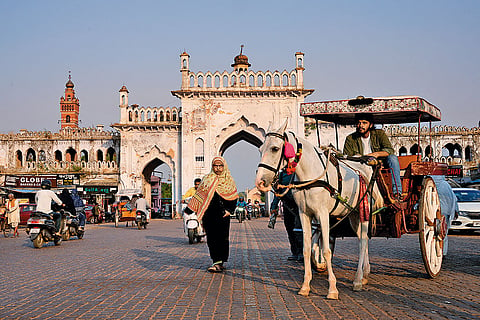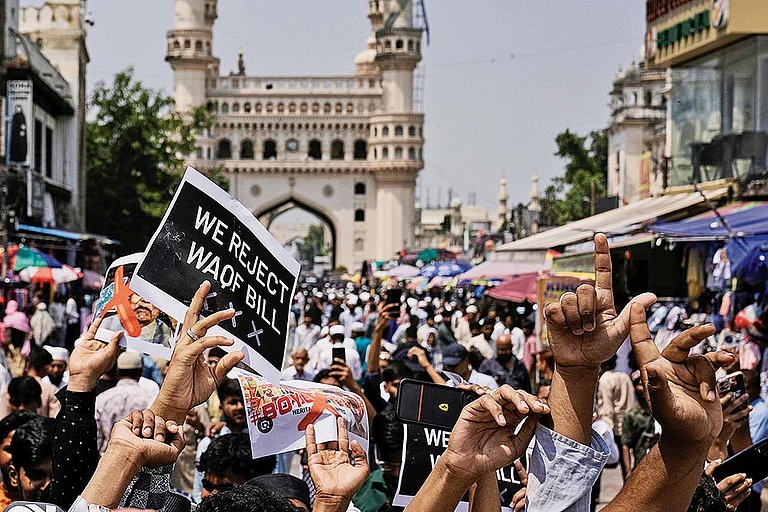Sajad Hussain has lived in the Shia Lines Waqf colony in Lucknow for five years now. His two-storey house is one of the few completed homes in the colony. The government slapped a ceiling case on it three years ago, stopping all construction.
Waqf Amendment Act: Fear Amid Loathing In Lucknow
An atmosphere of fear and the shadow of the bulldozer hang heavy over the heads of Lucknow라이브 바카라 Muslims who are against the Waqf Act, but are too afraid and worried to protest
Since then, the neighbourhood, like its structures, has been in a kind of limbo; cement, bricks and lives all kept on hold. When asked about the recently passed Waqf Amendment Act, Hussain laughs. “The Act? Oh, it라이브 바카라 excellent—exactly what we needed.” As he says this, Hussain라이브 바카라 eyes dart towards Bablu Bhai, also known as Syed Haider, the colony라이브 바카라 caretaker, seeking approval.
Haider, who oversees the day-to-day workings of the colony, has been living there for over nine years. He follows us around during our visit to the Shia Lines Waqf colony, whispering to each resident we speak to: “Just tell them about your life, how you are living here. No need to lie, but don’t say anything else.”
Haider is afraid, like every other resident in the Shia colony. They are scared that if one of them was to openly criticise the government in Uttar Pradesh, “a bulldozer might arrive at our gate tomorrow,” explains Hussain.
So, does he really think the 2025 Waqf Act is an excellent move for Muslims in UP? In a hushed tone, eyes darting again to ensure Haider isn’t nearby, he replies, “There is a lot of corruption inside the Waqf Boards, yes. But non-Muslims should not be part of the Boards. This isn’t right. Are there any Hindu institutions into which non-Hindus are forcibly inserted?”

The introduction of the 2025 Waqf Amendment Act (WAA) is mired in controversy. With all Opposition parties against the Act, the clash of anti and pro-WAA sentiments across India has only been surpassed by those seen during the CAA-NRC protests of 2020. Political parties across the spectrum, excluding the BJP, have called the Act “anti-Muslim.” Leader of Opposition (LoP) Rahul Gandhi has called it “a threat to the Constitution.” There are ten petitions lodged in the Supreme Court against it, including one by the Samajwadi Party, wherein its MP Zia Ur Rehman has said it violates the fundamental rights of the Muslim community. The lawyers’ collective, All India Lawyers Association for Justice (AILAJ), has also slammed the new amendment to the Waqf law in India, calling it “bigoted law-making.”
After both houses of Parliament passed the Act recently, the All-India Muslim Personal Law Board (AIMPLB) not challenged it in the Supreme Court. AIMPLB also called for protests against the Act every Friday till May 6.
On April 11, the first Friday after the President gave her assent to the Act, there were no public protests against it in Lucknow. Two days earlier, the UP Police, under instructions from Chief Minister, had announced the immediate cancellation of all leave for officers. Sources within the DGP라이브 바카라 office said the cancellation of leave was part of “precautionary measures” to ensure that there was “no unrest or violence” due to the passing of the Waqf Act.”
On that first Jumma, police personnel, along with central paramilitary units, stationed themselves outside all the major mosques in Lucknow, and also in Muslim-majority areas, along with 21 other districts across the state. “They were everywhere—we didn’t even step outside our house that day,” says 60-year-old Kaimun Banu.
The only protest that took place in the city was inside the Jama Masjid, within the Bara Imambara mosque in Old Lucknow. Members congregated wearing black armbands and the imam spoke briefly on the Act. It was a protest in name only—no one saw it; no one heard it. That was the idea. Just days ago, in Sitapur, less than 90 kilometres from Lucknow, 60 Muslims who protested the Act by wearing black armbands in public had been booked and ordered to furnish a security bond of Rs one lakh. Those named included several imams and maulanas. The legal action was sanctioned by the sub-divisional magistrate of Laharpur.

Women on Radar too
The shadow of ‘Bulldozer Justice’ looms large over the residents of Lucknow. Kaiman Banu is visibly embarrassed to let us into her temporary home. She lives near Subhash Marg and her house was razed during the CAA-NRC protests in which she took part. Her family—herself, her husband and two teenage sons—now live opposite a waste pile inside one of the snaking lanes of the neighbourhood. Their temporary home is not big enough for all four. The family sleeps together in a railroad apartment on the first floor of the shabbily constructed jhuggi, while their animals—seven goats—are housed on the ground floor.
Kaiman is part of the All-India Democratic Women라이브 바카라 Alliance (AIDWA). “My job is to make sure other women are getting what they need, but I don’t have anything right now,” she says. She moves around the house adjusting and hiding laundry hung on visible rafters, cleaning goat urine from the floor and insisting that this reporter take the only seating available: a broken bed under which all the family라이브 바카라 worldly possessions—whatever they could salvage from the wreckage of their home—are crammed. Five years on, the family is rebuilding brick-by-brick at the snail라이브 바카라 pace their income allows.
“They had tried to demolish our homes here again as well, when we protested about them evicting the Muslims from Akbarnagar, but we took to the streets and blocked them,” she says.
On June 19, 2024, the UP government demolished over 1,800 structures, including 1,169 homes, in Akbarnagar. The state government claimed these were encroachments that stood in the way of its plans to develop the area into the Kukrail Riverfront, transforming it into an ecotourism hub. Most residents of the area had lived there for decades.
“We lived there since before there was any development; they demolished my grandfather라이브 바카라 house,” says 29-year-old Hasina Begum. She now lives in a relocation home on the outskirts of Lucknow. “It라이브 바카라 terrible here—it라이브 바카라 a jungle. There are no metros, no transport to take us to work, no one to sell anything to or trade anything with. We’ve basically been thrown aside, far away from the Hindus so they never have to see us,” she adds.
The only protest that took place in the city was inside the Jama Masjid, within the Bara Imambara mosque.
Hasina had a stable job as a cook and cleaner in an upper-middle-class home in Gomti Nagar before the demolitions. But because she was relocated far from the suburbs, it would take too long for her to travel to work and her employer eventually fired her. She is now unemployed and at a loss about how to support her family, including three children.
Two hours outside of Lucknow, Summaiya Rana, the national spokesperson for the SP, sits in her family farmhouse. She cannot enter the city for fear of arrest. There is a warrant against her for spreading communal disharmony. Her crime? “I spoke up about Waqf on social media and some news channel. I didn’t even leave my house because the police wouldn’t let me,” she says.
The courts have asked her to pay a Rs 10 lakh bond to secure bail. Her lawyers are challenging this in the local trial court. The authorities know where Rana is, but no one has come to arrest her in her farmhouse. “What they want is for me not to be in Lucknow; not leading any protests,” she explains.
This isn’t the first time Rana has clashed with the state government. “During the CAA-NRC protests, the police kept me under house arrest throughout the whole month of Ramzan. Every Thursday and Friday, I would be under house arrest. It라이브 바카라 almost a habit for me now,” says Rana.
And she라이브 바카라 not the only one. Eram Shabrez, the president of the Aam Aadmi Party in Lucknow, also has a notice against her for which she must pay Rs 10 lakh as surety. She had written against the Act on Facebook on April 4. The next day, police slapped a notice on her. “Protests aren’t a crime, but they’ve charged me with everything they could think of,” she says.
Along with these women, four men from the SP have also been charged for protesting or, as the first information report (FIR) in Eram Shabrez라이브 바카라 case states: “violating the peace.” They each have to pay Rs one lakh as bonds.
Students Threatened with Arrests
On Ambedkar Jayanti, April 14, Lucknow was awash with celebrations for Babasaheb. The chief minister, along with deputy Chief Minister Brajesh Pathak, minister Swatantra Dev Singh and other leaders, paid floral tributes to Ambedkar on his 135th birth anniversary in Hazratganj. The CM also reportedly attended a function at the city라이브 바카라 Babasaheb Bhimrao Ambedkar University (BBAU). However, before the festivities, several BBAU students known for their activism received a chilling notice. “Stay away from the school during the event, don’t come for the celebrations or risk being prosecuted,” it stated.
“These students have no prior criminal record; they are not involved in any cases of violence or rioting,” says Abdul Wahab, a research fellow at Ambedkar University in Delhi and a resident of Lucknow. Wahab shared copies of these letters with us.
Local journalists were unperturbed by the news. “This is normal; it happens all the time,” laughed Mohamed Khan (name changed on request), a journalist who has been covering politics in Lucknow for the past ten years.
Four days earlier, on April 10, city police registered an FIR against a group of unidentified students from Lucknow University for “disrupting traffic” on University Road during a protest. Charges included Section 7 of the Criminal Law Amendment Act, which carries a prison sentence of six months to one year.
Battered and Browbeaten
Lucknow라이브 바카라 Muslim community has been browbeaten into silence, says Hasina. “You tell me, how should we protest? If we speak out, our homes are destroyed, or cops file cases against us and our children,” she says in a tone that can only be described as hopeless.
But the constant debasement of their faith and community is what truly hurts.
“The other day I went to the electricity board office to pay my bill and the karamchari (employee) there went off on me: ‘Why do you care whether there라이브 바카라 light or not in your house? Isn’t it like that in all the mosques and Waqf properties?’ he asked me this,” narrates 28-year-old Naazmin Khan (name changed on request). She adds: “I wanted to tell him off, but how could I? I need to run my home too, so I stayed silent.”
Naazmin hangs her head. Her shoulders rise up and then fall as she lets out a defeated sigh. “It wasn’t like this before, you know? We used to live together—Hindu and Muslim. I remember my Hindu friends would send gujjiya (traditional sweetmeat) to us during Holi and we used to send sevaiya (traditional dessert noodles) to them during Ramzan. But since this government has come, that is all gone.”
Avantika Mehta is a senior associate editor based in New Delhi
This article is part of 바카라라이브 바카라 May 01, 2025 issue 'Username Waqf' which looks at the Waqf Amendment Act of 2025, its implications, and how it is perceived by the Muslim community. It appeared in print as 'Fear Amid Loathing In Lucknow.'


